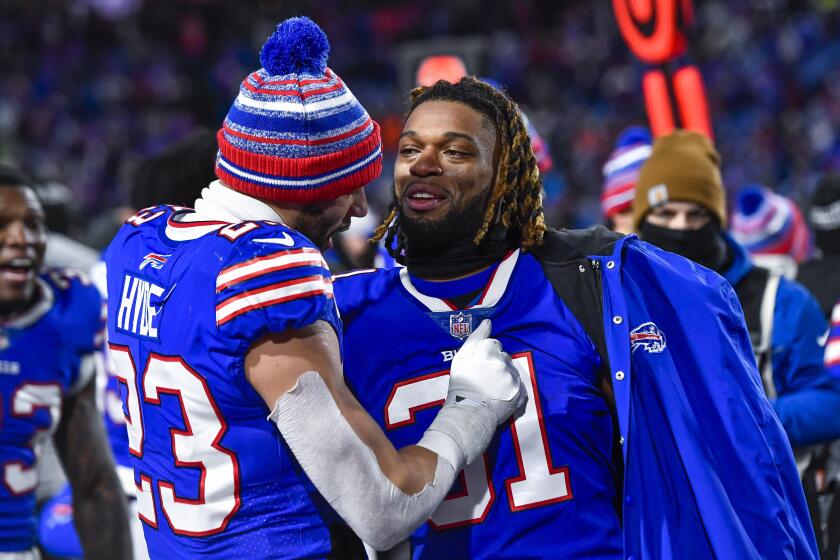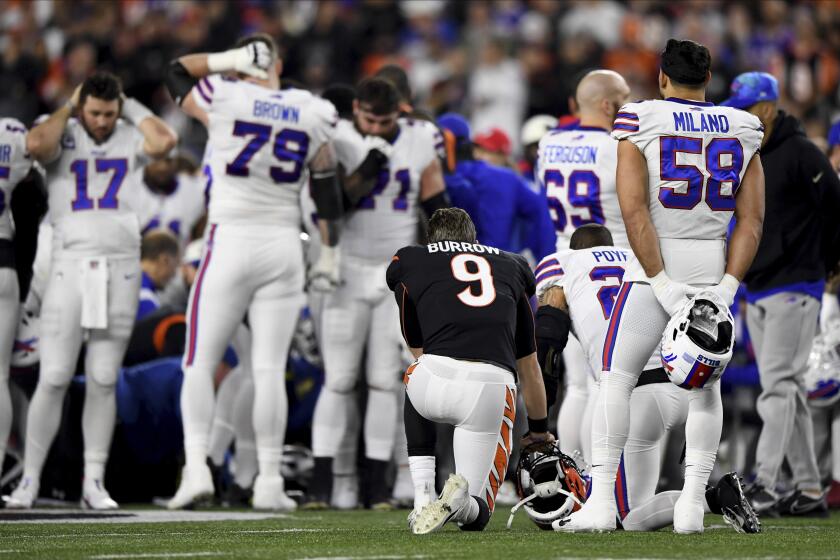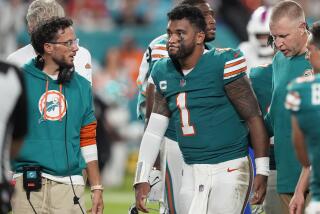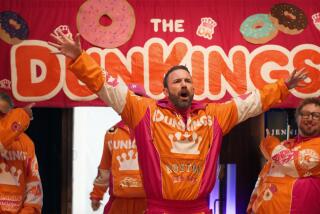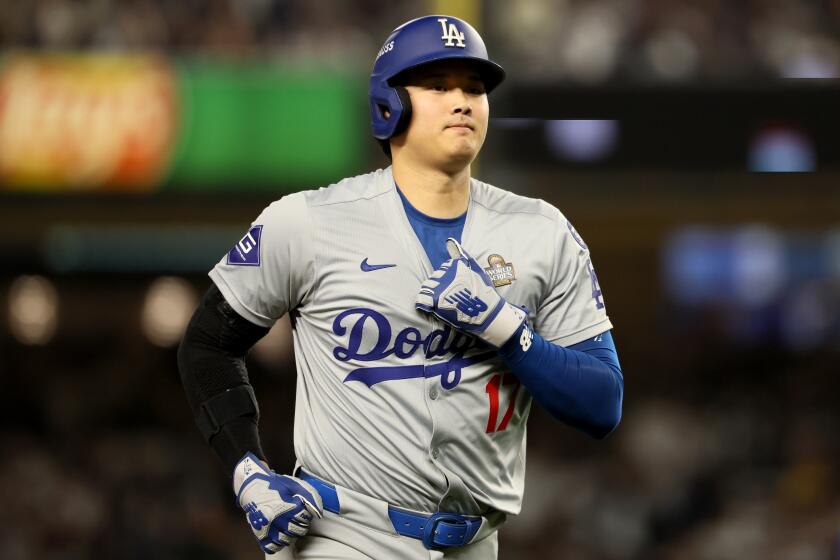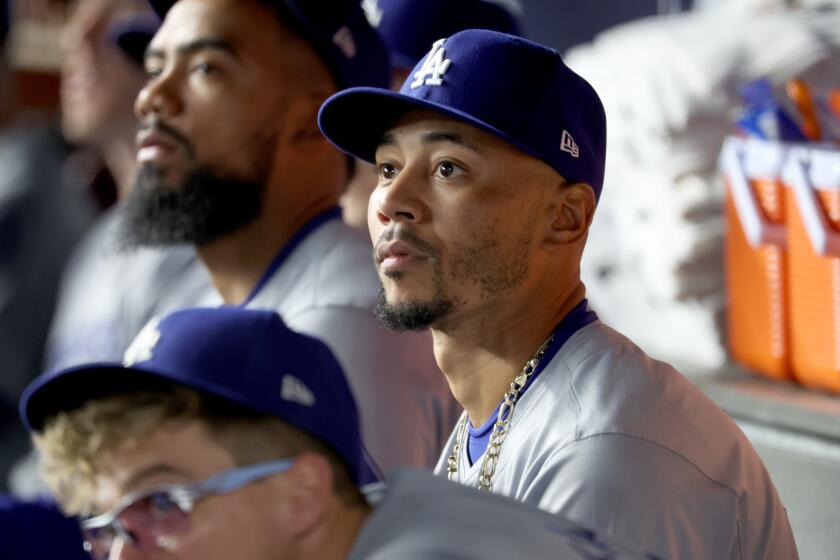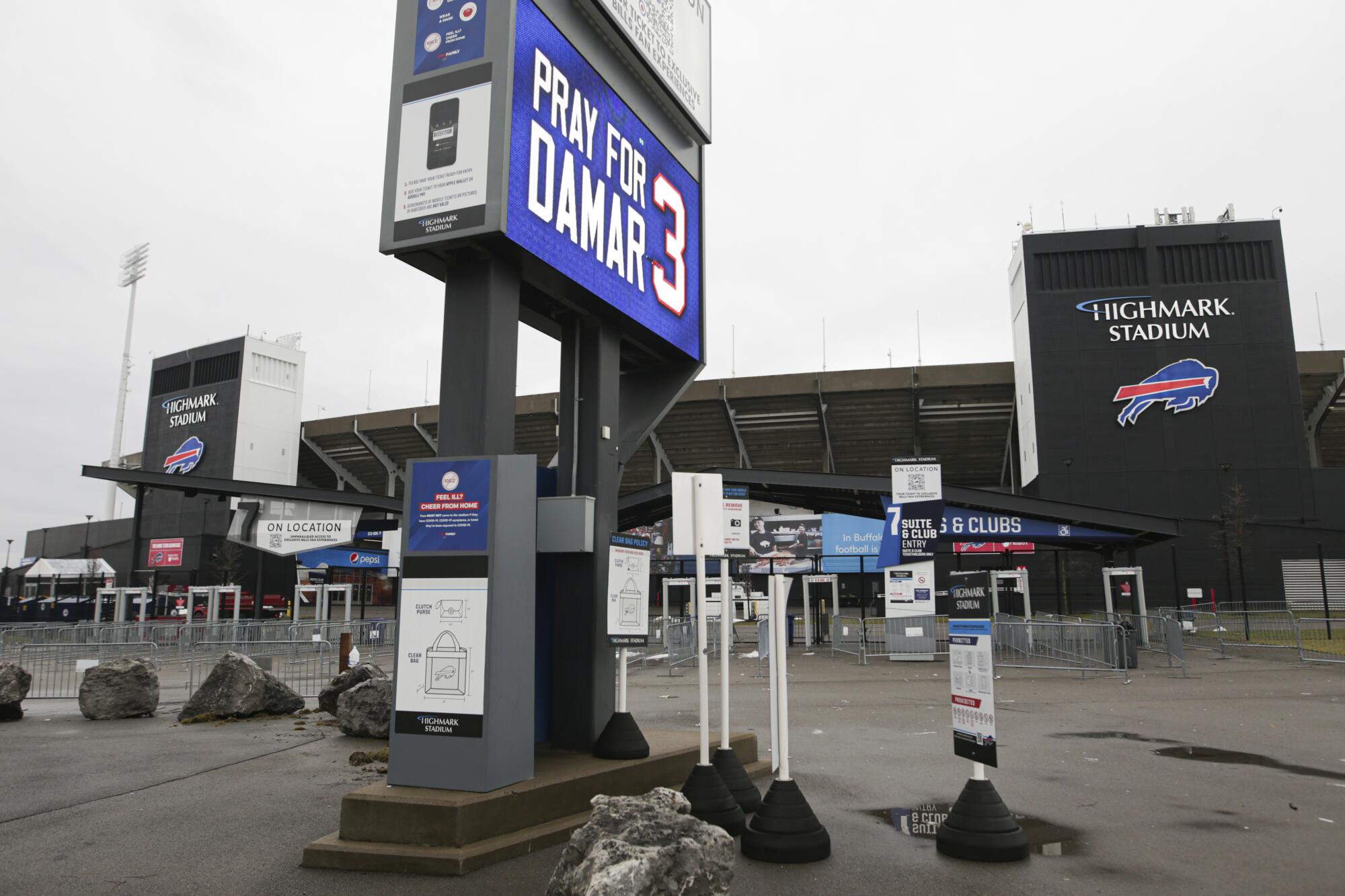
The game of football and its fans have never been particularly squeamish about injuries. When players tear a knee ligament or dislocate a shoulder, when they wobble away from a jarring collision, trainers help them to the sideline and play resumes.
What happened to Damar Hamlin during a “Monday Night Football” game this week was different.
Time and again, television cameras returned to the field where the Buffalo Bills safety had suffered a cardiac arrest and collapsed to the turf. Viewers watched for nearly 20 minutes while medical personnel scrambled to revive him with CPR and defibrillation.
As Hamlin remains hospitalized in critical condition, the question lingers: Was that scene horrifying enough to cause fans to second-guess their love for a sport so inherently dangerous?
“It is a complex question and I can tell you for certain it is not new,” said Brad Bushman, a communications professor at Ohio State University who has studied football’s appeal.
When the initial shock of the incident begins to fade, experts say, any serious debate over risking life to play a game must account for basic human psychology and the public’s long-standing hunger for violent entertainment. As Bushman put it: “This has been going on since the gladiators in Rome.”
Buffalo Bills defensive back Damar Hamlin is communicating through writing as he continues to “remarkable improvement” after going into cardiac arrest.
As of Thursday, the 24-year-old Hamlin was still intubated but neurologically intact and able to communicate in writing, asking about the result of the Bills’ game against the Cincinnati Bengals, unaware that it had been postponed after his collapse.
“When he asked did we win, the answer was, ‘Yes, Damar, you won,’” said Dr. Timothy A. Pritts, division chief of general surgery at the University of Cincinnati Medical Center. “‘You won the game of life.’”
With tests ongoing, it remains unclear whether Hamlin’s cardiac arrest was caused by his first-quarter collision with an opposing receiver or, perhaps, a pre-existing condition. Still, it is no surprise the episode has renewed debate over the games we watch.
“Serious sport has nothing to do with fair play,” author George Orwell once wrote. “It is bound up with hatred, jealousy, boastfulness, disregard for all rules and sadistic pleasure in witnessing violence. In other words, it is war minus the shooting.”
Boxing and mixed martial arts feature hand-to-hand combat. Hockey is known for its hard checks and fights. Race cars ram into walls.
Physical contact is certainly not the only reason to watch football, which can be exhilarating in its speed and athleticism. Tom Farrey, executive director of the Aspen Institute’s Sports & Society Program, says the game can offer fans a sense of community and is also wrapped up in gambling and fantasy leagues.
But a hint of danger might play a role in its status as the most-popular U.S. sport.
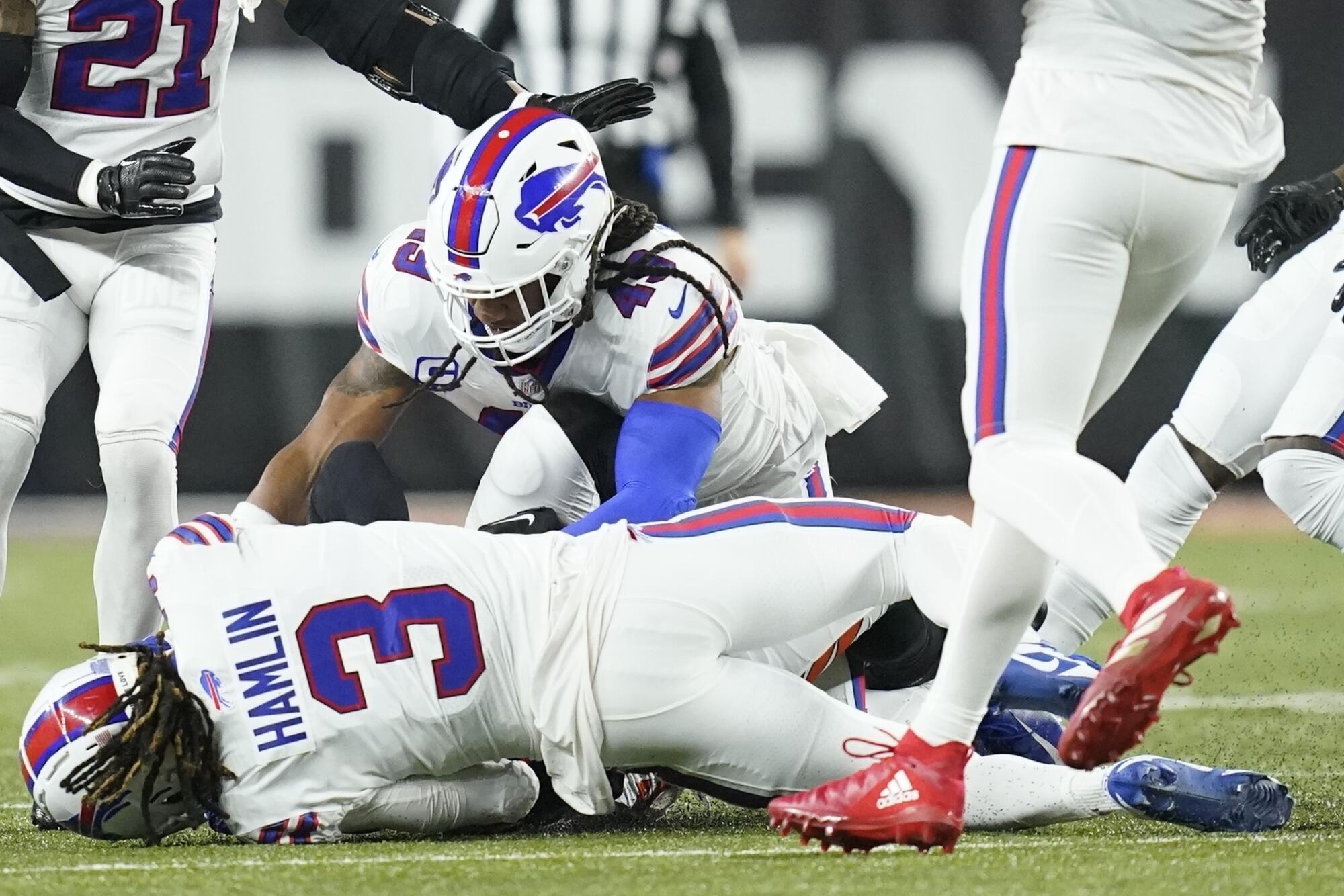
“The analogy I always use is, people like to watch NASCAR and part of the allure is the crashes. In the NFL, fans like to see big people running into each other.”
— Todd Jewell, a Texas State University economics professor
“The analogy I always use is, people like to watch NASCAR and part of the allure is the crashes,” said Todd Jewell, a Texas State University economics professor. In the NFL, fans “like to see big people running into each other.”
Viewers can satisfy this fascination, reveling in the fierce hitting, without any moral or legal implications. And when the injured player is carted away, they can choose to ignore the real-life consequences of what they have just witnessed.
This plays into the same dynamic when movies and television shows glamorize if not sanitize acts of violence, omitting depictions of any gruesome or authentic aftermath.
Monday night was different — and chilling — because there was no looking away. The game came to an abrupt halt as players from both teams crowded around Hamlin, some in tears, and an ambulance pulled onto the field.
“This was a human being having a heart attack in a public space,” Jewell said. “It’s going to make people think a little bit.”
Constant media updates in the days since have included hints of remorse from both broadcasters and fans accustomed to cheering for vicious quarterback sacks and jarring midfield collisions.
More than $7 million in donations have poured into a previously small fundraiser, a toy drive that Hamlin established two years ago. As one donor wrote on the GoFundMe page: “This is bigger than football.”
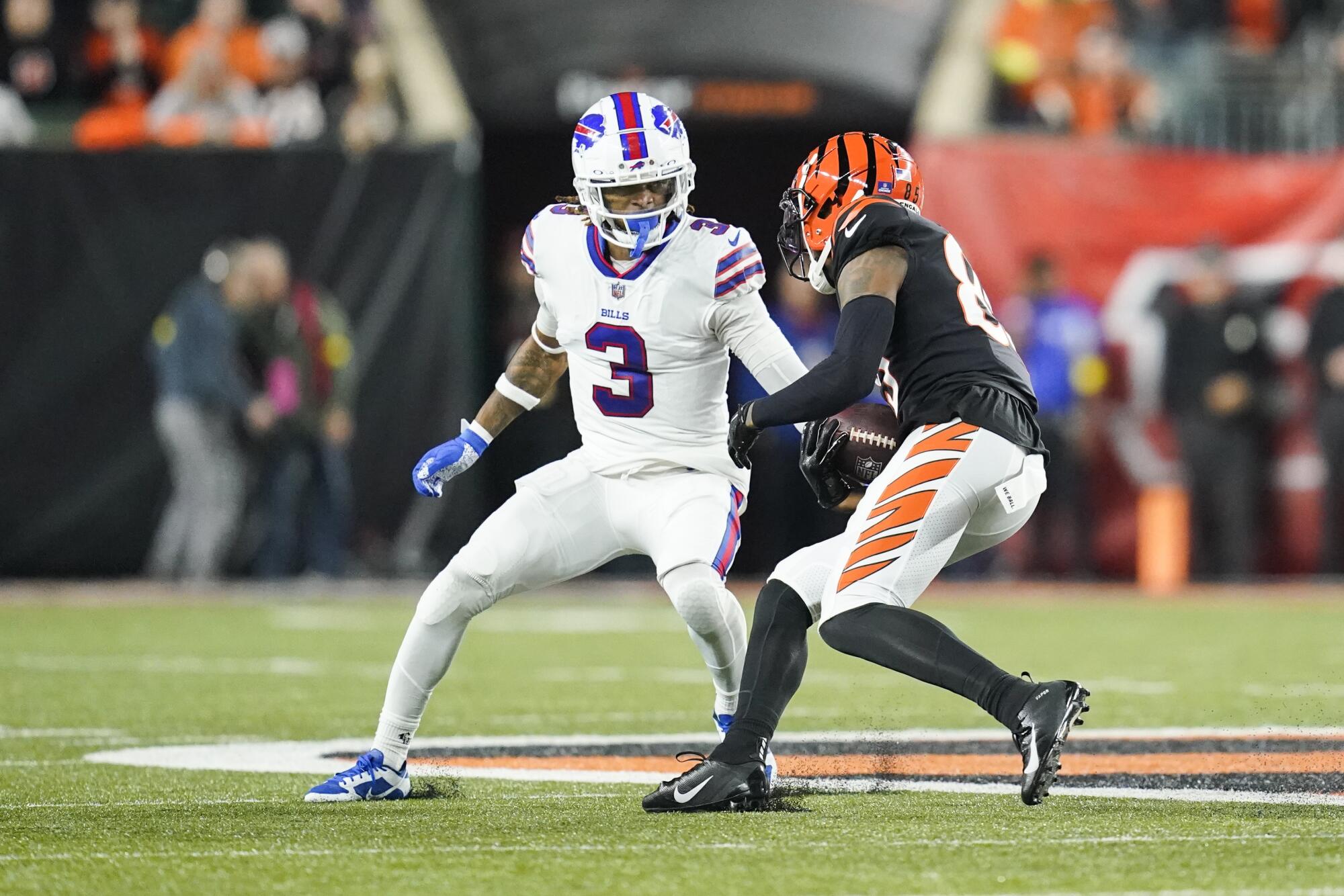
“This was a human being having a heart attack in a public space. It’s going to make people think a little bit.”
— Todd Jewell, a Texas State University economics professor
Still, experts wonder about any lasting effect.
When Hamlin launched himself at receiver Tee Higgins, it was a normal-looking tackle. He initially hopped to his feet and adjusted his facemask before crumpling backward to the ground. There was no apparent blow to the head — the type of contact that has triggered growing concerns about football and brain trauma.
Even as fans donate to Hamlin’s charity in droves, Bushman suspects that some may ultimately dismiss the incident as an oddity.
“One thing we know for sure, based on a lot of research, is that when people feel guilty, they engage in pro-social behaviors such as donations,” the professor said. “It’s one way to wash away the guilt.”
Certainly nothing about modern sport compares to the brutality of the gladiator games that packed arenas in the Roman Empire. The ancient Olympic Games included a sport called pankration in which competitors punched, kicked and choked each other.
In the modern era, the NFL has remained popular despite several heart-related fatalities. When Minnesota Vikings lineman Korey Stringer died from complications due to heat stroke during a 2001 training camp, the league established new protocols but faced no serious calls to abolish the sport.
Buffalo Bills safety Damar Hamlin suffered cardiac arrest on the field Monday night in Cincinnati. Here’s our coverage.
Similarly, the increased awareness of concussions and CTE, a neurodegenerative disease found in people who have suffered repeated head trauma, has resulted in limited rule changes and helmet improvements.
Green Bay Packers defensive lineman Kenny Clark was quoted on his team’s website as saying that players “just understand this is the game that we play and that’s the risk that we take.”
As disturbing as Monday night was, experts doubt it will cause the game to outlaw or significantly lessen its trademark brand of physical contact. Or that the public will make any such demands, at least not in great numbers.
“It would not be the same game,” Jewell said. “Any changes to make football safer are going to mean that some fans won’t like it as much.”
More to Read
Go beyond the scoreboard
Get the latest on L.A.'s teams in the daily Sports Report newsletter.
You may occasionally receive promotional content from the Los Angeles Times.

